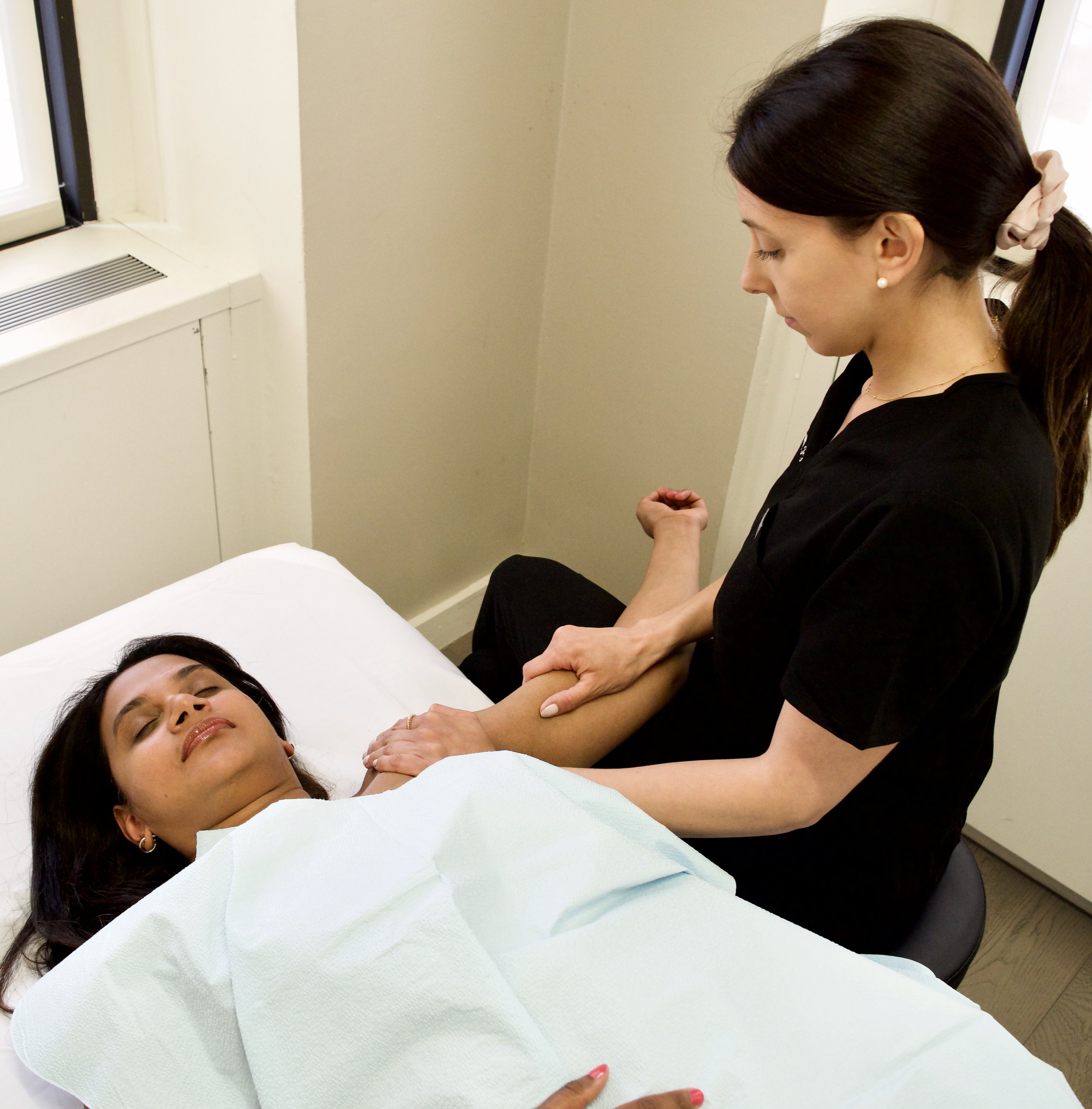
Breast Cancer Physical Therapy
2026 Update: Currently only accepting virtual physical therapy clients
If you’re experiencing any side effects from breast cancer treatment, I’m here to help you find relief.
Breast cancer and its treatments including surgery, chemotherapy, radiation, and hormonal therapy can cause a range of challenging physical and emotional side effects. While some of these effects may ease over time, most are long-lasting and can have a significant impact on your quality of life, function, and well-being.
It’s important to know that you don’t have to simply “live with” these side effects.
Breast Cancer Physical Therapy can make a real difference and is proven to play an important role in your recovery from breast cancer, from diagnosis to survivorship. The goal of physical therapy during and after breast cancer treatments is to minimize your treatment-related side effects, so that your overall quality of life and well-being can be improved.
Breast Cancer Physical Therapy can help with …
Pain
Scar tissue restrictions
Chest tightness
Decreased shoulder, neck and spine movement
Axillary Web Syndrome (Cording)
Radiation Fibrosis Syndrome
Post surgery swelling
Post Mastectomy Pain Syndrome
Arm and/or chest lymphedema
Decreased upper extremity strength
Cancer-Related Fatigue
Postural dysfunctions
Side effects of chemotherapy
Chemotherapy-Induced Peripheral Neuropathy
Brain Fog
Joint stiffness
I can help you prepare, both physically and mentally, for your upcoming surgery and treatments, so that you can optimize your recovery.
During your initial appointment, I will perform a comprehensive assessment to establish your baseline movement, flexibility, strength, and arm circumferential measurements. After identifying your needs, we will work together towards optimizing your overall health with the use of:
Hands-on physical therapy
Targeted individualized exercises
Relaxation techniques
Breathwork
Lymphedema Risk Reduction Principles
In addition to optimizing your physical health, your mental health is also my priority. I will provide you with evidence-based education to help you better prepare for your upcoming treatments.
Pre-Operative Therapy
Cancer Treatment & Beyond
I can help you overcome the side effects related to surgery, chemotherapy, radiation, hormonal therapy, so that you can improve your quality of life and overall well-being.
During our first appointment together, I will perform a comprehensive physical therapy assessment to identify any limitations in your movement, strength, flexibility, etc. Using an integrative whole-body treatment approach, our one-on-one treatment sessions together may then include a combination of:
Scar mobilization/massage
Soft tissue mobilization and Myofascial release
Lymphatic drainage massage
Breathwork and relaxation techniques
Therapeutic exercises
Individualized education
Whether you are undergoing active treatment or you completed your treatments years ago, I can help minimize your pain, improve your scar mobility, restore your posture and increase your mobility, flexibility and strength!
Interested in working together?
Schedule a free 15-minute phone consultation with me today to learn more.
Frequently Asked Questions
-
If you are experiencing any side-effects from your cancer treatments, then breast cancer rehabilitation can help! If you are still unsure as to whether or not cancer rehabilitation is right for you, do not hesitate to schedule a discovery call with me. I’d be happy to answer any of your questions!
-
Breast cancer rehabilitation helps those touched by breast cancer to maximize their physical, social and emotional well-being both during and after cancer treatments, through the use of a variety of rehabilitation interventions and exercise. It includes a wide range of hand-on therapies focused on minimizing or resolving the side effects associated with breast cancer and its treatment. The goal of cancer rehabilitation is to increase one’s function, independence, well-being and overall quality of life.
-
A common misconception is that breast cancer rehabilitation is the same as an exercise program.
While exercise is an integral component of breast cancer rehabilitation, hands-on physical therapy interventions are equally as important when it comes to helping you to move and feel better during every stage of your breast cancer journey. So I always use a combination of therapeutic exercises and hands-on therapy during my sessions.
-
All physical therapists are trained to restore range of motion, flexibility, strength and reduce pain with the use of a variety of hands-on techniques. However typically orthopedic and sports physical therapists usually do not have a thorough understanding of breast cancer treatments and the array of potential physical side-effects that you may experience.
A physical therapist specialized in breast cancer rehabilitation has extensive knowledge on cancer-related side effects and knows exactly how to help you safely manage and overcome those side-effects.
In addition, when treating a patient who is actively undergoing cancer treatments, specific precautions need to be taken into consideration by the therapist when it comes to performing hands-on therapy and prescribing therapeutic exercises to ensure safety.
-
No, definitely not! Physical therapy plays a vital role during the entire continuum of cancer care. In fact, there is considerable evidence supporting the safety and efficacy of physical therapy during chemotherapy and radiation therapy. While the goals of therapy will vary depending on your stage of treatment, we will always individualize your physical therapy treatments.
-
It is never too late to consult in physical therapy! Even if you completed your treatments years ago, together we can still improve your side effects, daily function and quality of life.
-
No! Physical therapy is a direct access service - meaning you can be evaluated and treated by a physical therapist without a prescription or referral from your doctor.
Keep in mind that some insurance plans require pre-authorization for follow up visits. If this is the case, after our initial consultation I will submit paperwork to your insurance company to get approval for more additional visits. If you're unsure about your insurance requirements, don’t hesitate to reach out to me, I’d be happy to help.
-
I am licensed in the state of New York and in the province of Quebec.

